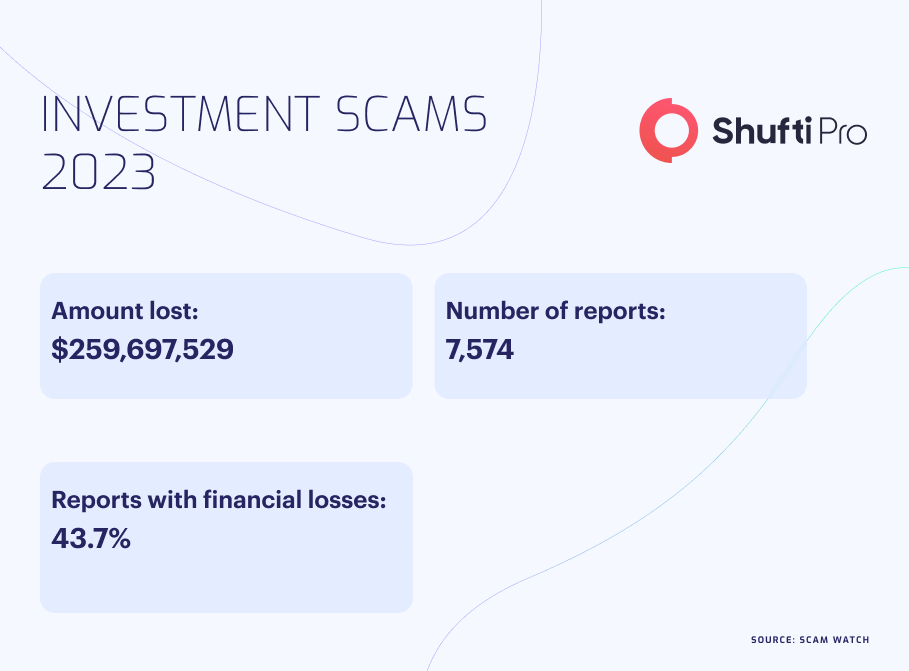Detecting & Preventing KYI Fraud | A Deep-Dive into 2023 Investment Scams

Businesses need to bring on reliable partners and investors who can contribute to growth, provide funds, and improve the business’s long-term outlook. But with the advent of artificial intelligence in the digital age, fraud and theft techniques have become more sophisticated, which puts the investing industry at risk of security lapses and necessitates the use of Know Your Investor solution.
The automation of processes has brought about a number of profound changes in the globe. Investment fraud has become more stringent than ever before, and the growth of digitalisation has given criminals access to a safe refuge from illegal activity. These days, they use contemporary technology to commit crimes, which makes it challenging to comply with Know Your Investor (KYI) requirements and confirm that the partner companies are enrolling legitimately. The United Kingdom’s Financial Conduct Authority (FCA) imposed £215.8 million worth of fines in 2022.
Investing is a prime target for scammers, so companies must have procedures to onboard real investors and perform appropriate due diligence checks, as well as comply with Know Your Investor (KYI) and Anti-Money Laundering (AML) regulations.
What is Know Your Investor (KYI)?
Know Your Customer (KYC) includes Know Your Investor (KYI), which confirms investors’ identities prior to onboarding. Every business eventually needs capital or funding in order to grow and expand. Companies onboard investors as a result. Businesses must investigate and confirm if a potential investor is legitimate or a scammer before accepting any money. Know Your Investor checks are a type of due diligence conducted prior to onboarding investors. Verifying potential investors guarantees they possess the requisite industry knowledge and are able to support firms in the long run. It remains compliant whilst providing protection from possible risks and threats.

Investment Fraud Rising Through Celebrity Endorsement
The FCA’s warning list of unlicensed investment brokers includes one in six firms that continue to operate, making financial fraud through celebrity endorsements a major problem. This development contributes to the unsettling trend of fraudulent celebrity endorsements, which was reported in the Metro. Furthermore, a lot of people still use famous identities—with or without consent—to support their businesses and prove their legitimacy. Famous athletes, actors, and singers are often used by scammers to entice victims into making investments.
According to the head of the Banking and Financial Fraud Litigation Department, Joanna Bailey, “the use of celebrities’ images to endorse the fraudulent brokerages often lulls the novice investor into having confidence in the investments on offer. Victims genuinely believe that if an admired sportsman or businessman supports an investment scheme, that it must be sound and the firm is legitimate” Joanna further pointed out “the investment market is complex and risky, before considering investing you should always check if the firm is FCA registered, even if the firm states that it is FCA registered if it is based in the Cayman Islands or some other off-shore location you will not be protected by the Financial Ombudsman. You should also consider whether the celebrity endorser is likely to have the necessary investment market expertise to be able to judge the scheme being promoted.”
Americans Lose $3.82 Billion to ‘Phantom Property’ Investment Fraud
The public in America is being made aware of the importance of dishonest investment schemes. Scams involving cryptocurrency and “Phantom Property” have cost $3.82 billion in damages thus far.
With $3.82 billion lost thus far, Americans have fallen victim to previously unheard-of amounts of cryptocurrency and phantom investment schemes. The largest loss of any state, an estimated $870 million, was suffered by 4,982 Californians at the hands of investment scammers in 2022. Investment fraud was the main reason for the 128% rise in money theft between 2021 and 2022.
The majority of losses are recorded in California, followed by New York, Florida, Texas, Washington, and New Jersey, according to a new survey conducted by the investment fraud attorneys at Carlson Law. $306 million was taken from residents of Florida, $235 million from residents of Texas, $173 million from residents of New York, and $110 million from residents of New Jersey.
One instance of investment fraud is participating in a scam that promises large returns. Victims are persuaded to invest in ponzi schemes, fake cryptocurrencies, and even phantom properties through a variety of deceptive tactics. Artificial intelligence has been utilised in scams recently to trick people into investing in unreal projects.
The Federal Trade Commission (FTC) predicted that by the end of 2023, investment fraud would cost Americans $3.82 billion. By contrast, the $1.67 billion loss seen the year before was a 128% rise. The growth is believed to have been influenced by cryptocurrency investment schemes, which cost Americans $2.57 billion in losses just last year. The percentage increased from 2021 to 2023 by nearly three times.
The news is the most recent proof that bitcoin frauds are becoming more common, following a warning from the Secret Service. The fraud entails seducing victims into romantic partnerships to get them to fund illegal cryptocurrency ventures.
FCA Fines ADM for Inadequate AML Measures
The commodities investment broker ADM Investors Services International Limited was fined $7.9 million by the UK regulatory body Financial Conduct Authority (FCA) for noncompliance with the Anti-Money Laundering (AML) legislation.
According to FCA, the ADM investors were penalised for having inadequate compliance systems and controls. Additionally, they stated that the nature of the business carried a high risk of money laundering due to its global clientele and activities, which included high-risk demographics, including politically exposed persons (PEPs). The watchdog said they had not taken strong steps to reduce the danger by implementing strict anti-money laundering and counterterrorism financing rules and procedures. They said that to fight money laundering-related crimes, ADM must implement sufficient AML safeguards.
The regulatory body stated that in 2014, it brought up concerns with ADM. But when it was brought back to the company two years later, in 2016, the authorities found that no firm-wide money laundering risk assessment had been carried out and that reference legislation had remained abolished. FCA joint executive director of enforcement and market oversight, Therese Chambers, stated, “ADM Investor Services’ failures put it at risk of being used to facilitate financial crime. These failings continued even after the firm had received clear warnings on the need to improve its systems.”
ADM Investors should fortify their systems and procedures going forward to safeguard investors and the integrity of the global financial ecosystem to guard against fines from these regulatory bodies. To guarantee they are held to the highest regulatory compliance requirements, they must pledge to communicate with their stakeholders. The company said in the statement, “ADMISI is pleased that the issue has been resolved and is confident in the actions put in place to meet all regulatory requirements.” FCA added that ADM accepted the FCA’s final results, which means it is accepted for the 30% discount on the fine.
CySEC Warns Investing Firms for Non-Compliance
Board members who are in charge of supervising compliance measures are among the financial institutions that the CySEC cautions about failing to abide by the AML requirements. The commission claims that companies’ AML screening procedures and controls have a number of flaws. They highlighted the board members’ responsibility to protect global norms in the fight against money laundering and terrorist financing. The prior research reveals deficiencies in terms of compliance, thus, the Commission warned them to “enhance their performance and promote a culture of integrity and high ethical standards.”
The commission has previously addressed the financial sector’s flaws on numerous platforms; nonetheless, this warning pertains to the implementation of stringent monitoring of the measures. CySEC emphasised that businesses that do not comply with the laws will not be protected.
Know Your Investor With Shufti
The current criminal cases are negatively affecting the investment sector despite the fact that numerous international regulations have been implemented and significant efforts have been made. It’s important to know an investor’s background and eligibility requirements under the applicable laws of the country before onboarding them. Because of this, financial institutions and other investment businesses have to make sure that they only accept genuine investors. The company’s client identification verification solutions can detect fraudulent activity, protect operations, and safeguard investors’ funds by including Know Your Investor (KYI) checks.
Shufti offers a cutting-edge KYI solution that is fast, easy to use, and economical. Our client’s current system can easily integrate our straightforward SDK and API. Easy-to-use questionnaires provide accurate information, and our skilled MLROs provide comprehensive reports and comply-compliant risk and fraud screening.
Struggling to securely onboard investors whilst maintaining compliance?











